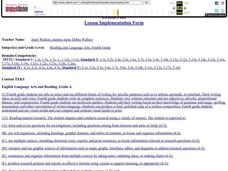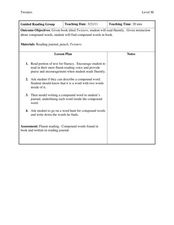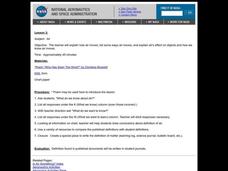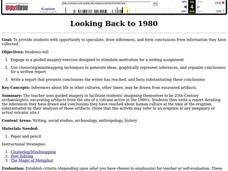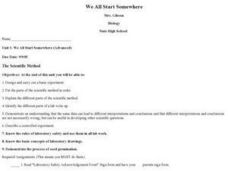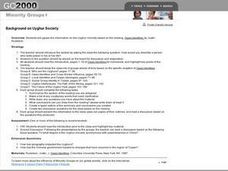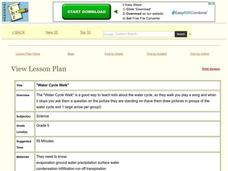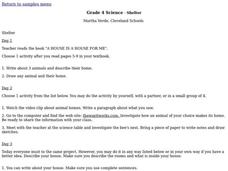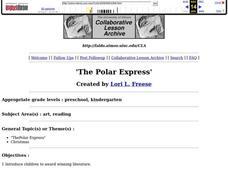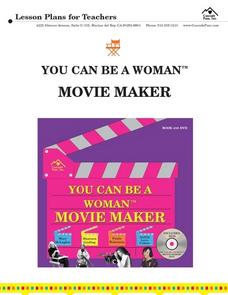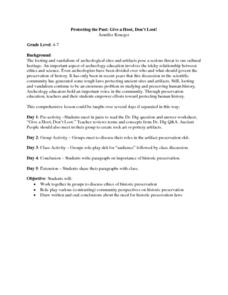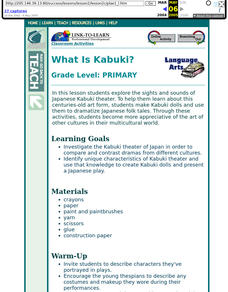Curated OER
"What Do You Mean?" How Language Changes Over Time
Students examine words used at Jamestown in 1607. They predict what the words meant in 1607, write sentences using three of them, then analyze the sentences after they have read the actual definitions of the words.
Curated OER
Studying Japanese Internment with Primary Documents
Eleventh graders view photographs of the Japanese society being interned in camps during World War II in the United States. In groups, they read and discuss Executive Order 9066 and try to determine what group they are trying to focus...
Curated OER
The Odyssey Plan
Ninth graders read and analyze The Odyssey. They apply note-taking skills to identify enemy, type of enemy, and traits demonstrated throughout the book. Students create a storyboard that illustrates the selected episode from the book...
Curated OER
Owning a Pet
Fourth graders identify and use different forms of writing for various purposes. Using the internet, they read and gather information and write quesitons for their own investigations on the various pets they could own. They practice...
Curated OER
Charlotte's Web
Students read the story of Charlotte's Web. They discuss what it means to be a friend. Students discuss the way Fern and Wilbur's fiendship began. They answer the following questions: How was Fern a friend to Wilbur before she had even...
Curated OER
Hamlet and the Pirates
High schoolers use seventeenth century primary sources to understand the off-stage pirate attack that occurs in Hamlet. Students read and discuss Hamlet's letter to Horatio from the play, Hamlet. High schoolers analyze primary documents...
Curated OER
Twisters
Learners differentiate between the terms 'tornado watch' and 'tornado warning' and simulate the conditions that produce tornadoes. They read "Night of the Twisters" by Ivy Ruckman and conduct an experiment using two-liter plastic...
Curated OER
Air
Students complete a KWL chart on what they know about air. Reading a poem, they compare published definitions of air with the ones they created. They write the definition of air on a bullentin board. They also write their observations in...
Curated OER
A World Of Matter
First graders complete a variety of experiments with solids, liquids and gases. They read books about matter, identify the characteristics of solids, liquids and gases and the sort and classify a variety of matter. Students make...
Curated OER
What's Up with Waste?
Fifth graders design a brochure that identifies types of solid waste that are often improperly disposed, explains the effects of this disposal and proposes a solution to the problem. The read humorous books, define vocabulary words and...
Curated OER
Sex Stereotypes in Society
Students analyze a collection of advertisements or photographs in a text or magazine and identify the stereotypes used or possible biases of the editors. They discuss how these stereotypes are formed, and the ways in which they impact...
Curated OER
Looking Back to 1980
Pupils use clustering/mind mapping techniques to generate ideas, graphically represent inferences, organize their conclusions and write a report that presents conclusions the writer has reached, and facts substantiating those conclusions.
Curated OER
We All Start Somewhere
Students demonstrate an understanding that the same data can lead to different interpretations and conclusions and that different interpretations and conclusions are not necessarily wrong, but can be useful in developing other scientific...
Curated OER
Background on Uyghur Society
Students are introduced to the history of the Uyghur society. In groups, they read various chapters of their text, they summarize the material, write down any questions they need answered and create an outline. They present their...
Curated OER
Costa Rican Ecosystems
Learners read about the Cloud Forests in Costa Rica and then answer critical thinking questions about how to prevent loss in this forest and how to slow down global warming.
Curated OER
Homology
Students investigate the concept of homology. They are particularly interested in finding information about developmental homology. Students design a new animal correcting obvious mistakes on a worksheet provided by the teacher. They...
Curated OER
Water Cycle Walk
Fifth graders explore the water cycle. Students walk in a circle as a song plays. When the song stops, 5th graders answer questions about the picture on which they are standing. In groups, students draw pictures of the water cycle.
Curated OER
Shelter
Fourth graders listen as the teacher reads out loud "A House Is A House for Me". Each day for five days the students choose one activity out of two or three to complete. Conclusion arrives when all the students describe and write about...
Curated OER
What Do You Know About Saturn?
Students discuss what they know about Saturn. They create drawings to show what the planet looks like and identifies its characteristics. They write a paragraph about the planet as well.
Curated OER
The Polar Express
Students listen to the picture book, The Polar Express, and review events that happened in the story. Students draw pictures of what they might have seen on the way to the north pole.
Curated OER
YOU CAN BE A WOMAN MOVIE MAKER
High schoolers research and participate in activities to find out more information about women movie-makers.The use of reading a script and making storyboards are just a couple of examples.
Curated OER
Protecting the Past: Give a Hoot, Don't Loot
Students discuss the looting and vandalism of various archeological sites. In pairs, they read and complete a worksheet and review their answers as a class. In groups, they role play a artifact preservation skit and perform it to their...
Curated OER
Classroom Conservation
Fourth graders suggest ways paper and other natural resources can be used and recycled in the classroom. Students conduct a investigation into paper use and make distinctions among observations, conclusions (inferences), and predictions.
Curated OER
Eating Your Words!
First graders study how to complete activities in sequential steps. They participate in various activities describing each step needed to complete the tasks. They work in pairs to type the list of steps necessary in making a sandwich. ...





